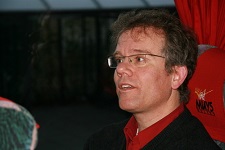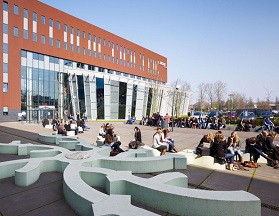Universities of Applied Sciences have undergone a major transformation in the past few years, says Avans University’s Han van Osch. They orient themselves much more towards practical results, and try to fulfil directly the needs of the business community. They now play a crucial role in the development towards a biobased economy.

For many years, Han van Osch was one of the driving forces of the Centre of Expertise Biobased Economy, operating from his positions at Avans and HZ Universities of Applied Sciences; recently he was appointed deputy manager of Avans’ Academy for Industry and Informatics. How, on the basis of his experience, does he look upon the developments in the biobased economy, particularly in the area that he knows best, the South-western part of the Netherlands? Does he agree with our observation that development has slowed down? ‘Developments should indeed be speedier. But we know that transitions always develop irregularly, that periods of quick and slow developments alternate. With the right kind of impulses, the development should be able to speed up again.’
Regional focuses in the biobased economy
‘The national government is much less of a stimulus now than regional authorities. But in the Netherlands, too many regions concentrate just on themselves. On the one hand, they should focus more on their regional strengths, on the other hand they should cooperate better. Within the regions, centres of expertise and education play an increasingly important role. Often, in the bigger picture their results are not yet very visible, because they primarily assist small and medium sized companies. But in their work placements, they have made a shift towards practical assistance, driven by demand. The company instead of the university formulates the research subjects. Hence, the work of the students on work placements bears direct relevance for the company. The aim of these projects is helping to apply existing knowledge to the company. As a Centre of Expertise we also have knowledge vouchers, as an extension of the research done by universities of applied sciences in recent years. Through such a voucher, companies can contract the assistance of teachers/researchers; on the condition that the company invests the same amount of money as the Centre of Expertise, in cash or in kind. That model is very successful.’

‘In the Biobased Delta we have had very good results along these lines, and there is more to come. For instance our biopolymer research is quite sophisticated. At our biopolymer application centre in Breda, there is a strong culture of entrepreneurship. We also investigate plant ingredients, for instance we have developed a lot of knowledge on pigments from vegetal resources. In the field of biorefinery, our research might result in breakthroughs. And this kind of innovative education, in which research and practical application are next-door neighbours, is more fun, both for students and for teachers; and we experience now that companies increasingly call upon us.’ Says Han van Osch. Therefore, it is distinctly possible that there are major developments going on behind the screens, that might give a new boost to the biobased economy soon.
Author
Diederik van der Hoeven
Source
Supplier
Avans University of Applied Sciences
Biobased Delta
Centre of Expertise Biobased Economy (CoEBBE) - Avans
Share
Renewable Carbon News – Daily Newsletter
Subscribe to our daily email newsletter – the world's leading newsletter on renewable materials and chemicals










